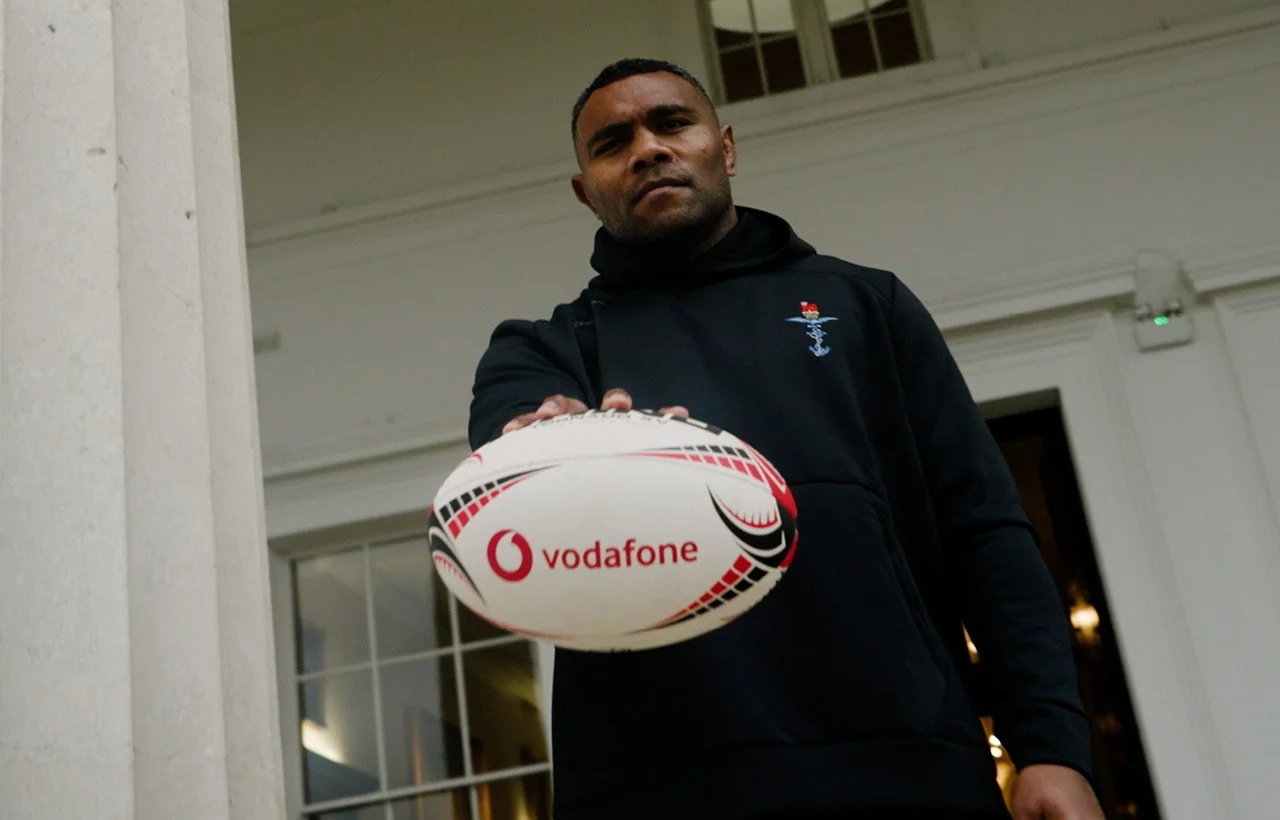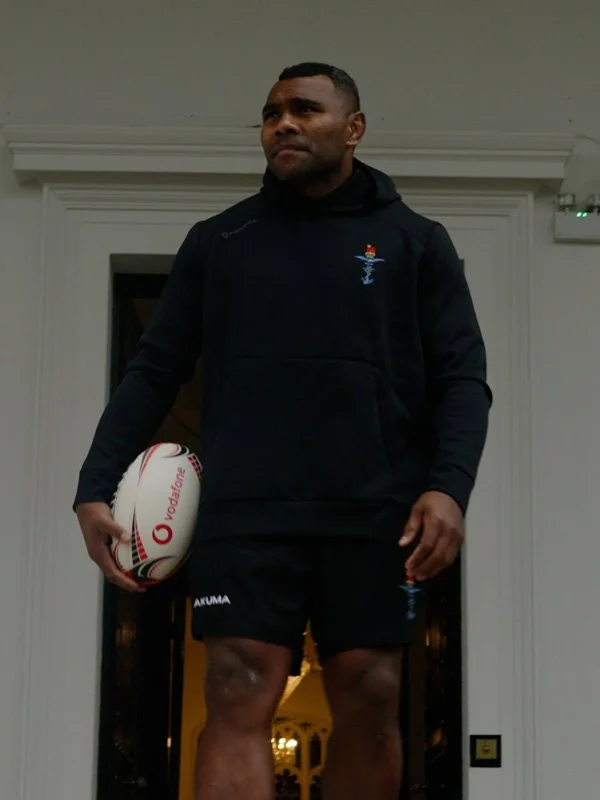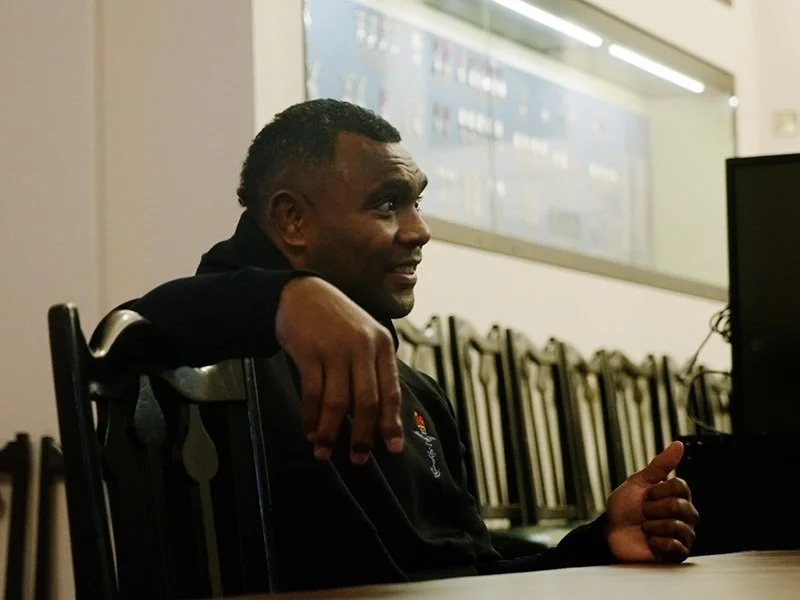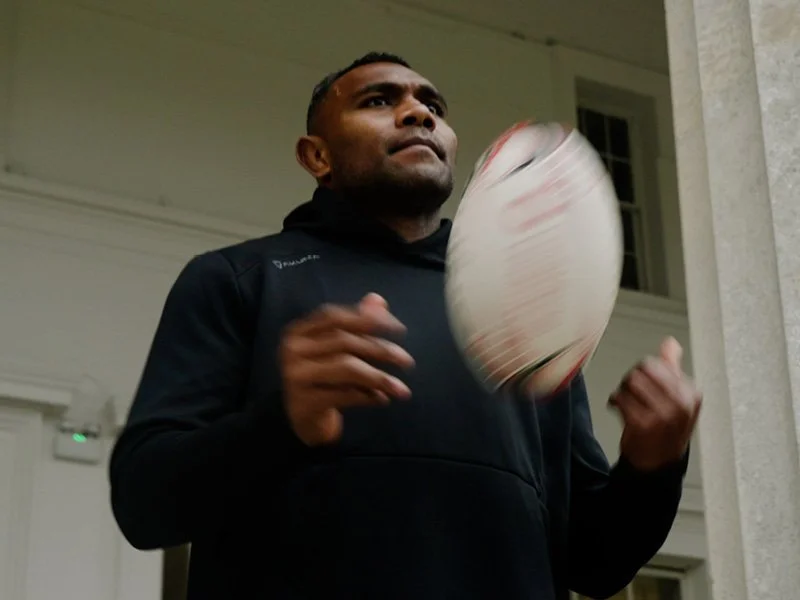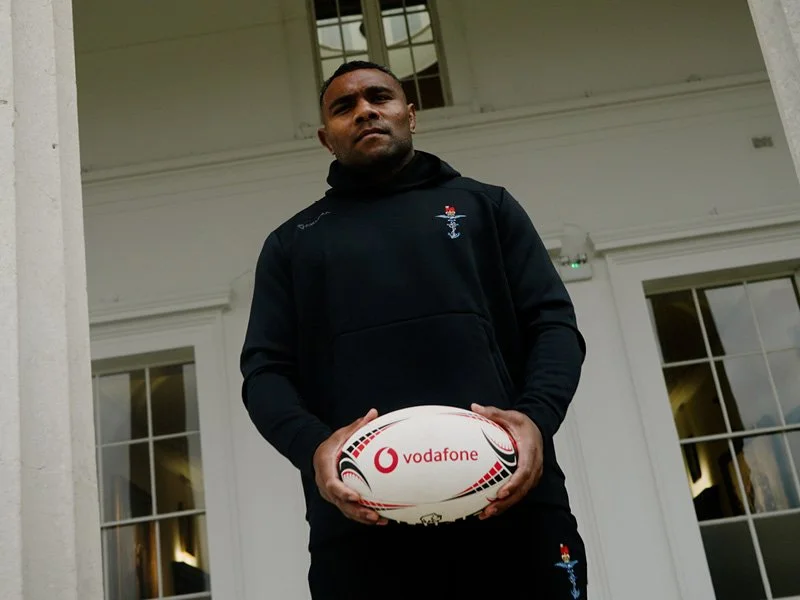Semesa Rokoduguni
Before he donned the white of England, Semesa Rokoduguni wore the green of the Army. From Afghanistan to the Premiership, his story is one of service, sacrifice and gratitude, and now, of giving back to the uniform that shaped him.
When Semesa ‘Roko’ Rokoduguni was deployed to Afghanistan, he wasn’t yet the free-scoring England winger who would later light up Twickenham. He was a young man far from home, having left Fiji to serve as a British soldier in an unfamiliar land, driven only by the hope of supporting his family and making his dad, who had served in the infantry of the Fijian army, proud. After five years of training, the call came, and he was ready.
“I went to Afghanistan in 2011,” Roko remembers, “where I was attached to the 4SCOTS [The Royal Regiment of Scotland] regiment. We did a six-month tour, where we did foot patrols with them for the whole six months.
“It’s always dangerous out there, and it would have been if I had been sent out there at any time, because you never know what to expect from countries like that. But I felt like I had been training for that moment for five years, and to have the opportunity to put everything I had learnt into practice was important to me.
“It was common for soldiers to want to get posted over there, it’s like playing on the rugby field, you can train as much as you want, but if you do not get to play, it gets frustrating.”
Roko was deployed to Afghanistan in April 2011 as part of Operation Herrick, where the 4SCOTS supported the Royal Marines. Their six-month tour centred on mentoring and training Afghan security forces, as well as conducting foot patrols, moving from village to village on the ground, working to maintain security in a country that had already claimed the lives of 395 British service personnel by 2011, with the heaviest losses coming between 2009 and 2010.
“In Afghanistan, there are compounds and we had a variety of tasks to undertake to go out and make sure that everything is secure in these compounds,” Roko explains. “We’ll be gathering intelligence, asking whether there is anything unusual that is happening in the area, then we’ll feed this back to the headquarters, and then they will come up with the aim for the next foot patrol.
“I remember the change of scenery and environment in itself took a lot of getting used to that. But in terms of seeing a lot of action, like all that stuff that you might hear about, it definitely happens, but it didn’t happen in our area of operation.”
Roko joined the Army aged 19, when all he had known was the picturesque town of Nausori, on Fiji’s main island Viti Levu, and its surrounding highlands. He received an invitation letter to come and join the British forces, and committed himself to a series of mental and physical tests, which he passed.
“When I got that letter to come and join the forces, I was excited for the opportunity, but so nervous leaving home for the first time. This was not leaving to go to the other side of Fiji,” Roko says, arms stretched out wide, “this is leaving for the other side of the world.
“There’s quite a lot of Fijians in the forces because over the years, the British services have been sending recruitment teams out there in Fiji to see whether anyone would be interested in joining the military.
“They’d teach us a little bit about what the Army stands for, and often Fijians are keen to sign up and depending on where you finish in the physical and mental tests.”
When he joined, he felt as though he had an idea of the type of soldier he was going to be, but his Army career took a very different turn out of necessity, rather than choice.
“My dad is a soldier in the Fijian army,” Roko says with a smile, “and the picture I had in my head is a soldier picking up a rifle and going to war.
“When I finished my training, the armoured infantry and the tank regiments were undermanned, so I had to join the ‘tankies’. I knew that because I had spent so much money just to come over here, I should just go with what was available.
“It took me a couple of months to study everything, because as a tank driver you have to look after the whole tank, changing the track oil and running a series of checks, and then I went over to Germany where I did the gunners course.
“There I learnt how to operate the mounted machine gun on top of the tank. So you control that from the inside, using something like a remote control. For me, I was blown away by the whole thing, I’d never even seen a tank in real life before I joined, it was awesome.”
In Germany, Roko was posted to Bad Fallingbostel, a town in Lower Saxony, famed for its military postings. The British had a military base at Bad Fallingbostel because the town sat within what became the British Zone of Occupation in Germany after World War II, and it remained a strategically important location throughout the Cold War.
It was out there that Roko made up the numbers in a Sevens tournament at the behest of his fellow soldiers. His side won, and he was named player of the tournament as he bombed through to the try-line on countless occasions, leaving a trail of floundering servicemen in his wake.
A coach took his details and, before long, Roko was called up to play for the Army sevens team. “From there I played in lots of sevens tournaments, and I was away from my regiment quite a lot, I was based at Aldershot Garrison at the time,” he remembers.
“I was drafted into the Army XV team, and in my second year playing for the side, I won man of the match at the Army v Navy game at Twickenham. Mike Ford [defence coach at Bath at the time] was watching the game and phoned up my regiment directly asking if I was available to play.
“I spent three weeks at Newcastle, and then three weeks at Bath, who decided that they wanted to sign me. My Army boss turned round and said ‘we’ve never had to deal with a player joining a Premiership club before, but you should go, everyone at the regiment is backing you’.”
Roko was easy to root for. By the time he joined Bath, he was already an Army rugby hero, a man whose name stirred something among those in red and black. His Army v Navy debut came in 2012, where he announced himself with a hat-trick in a 48-9 victory before a crowd of 65,000. He repeated the feat in 2013 as he scored another hat trick, notched another try in 2015, and two more in 2016, all in wins for the Army, ensuring he became something of a legend in the process.
As he settled into life at Bath, still serving part-time with the Royal Scots Dragoon Guards, the tries kept coming. Four in his first three games of the 2014/15 season brought an England call-up for the autumn internationals and, on 8 November 2014, against New Zealand at Twickenham, Semesa Rokoduguni made his Test debut, the first serving soldier to play for England since Tim Rodber in 1992.
“When I joined Bath,” Roko says with a big smile, “I phoned my mum and dad who laughed at me, because I had only played two games of rugby in my village at home, and there wasn’t even a glimpse of a future rugby player in there.
“When Stuart Lancaster called up two years later, I was like ‘nah, this must be one of the boys’. It was for real, my dad was speechless and my mum was in tears. My Army boss spoke to me and said I’d be out there representing England, but also my family and my regiment.
“I had a few mates, because I’m in the Scottish regiment, joking with me, saying I should take my stuff and leave, but I told them I hadn’t got a call from Scotland, and I had to go with this.”
Between 2014 and 2017, Roko earned five England caps, a number that might have been far higher were it not for the calibre of his competition, with Anthony Watson, Jonny May and Elliot Daly all in their prime. It was a remarkable journey for a man who once gave up the game after just two matches in Nausori.
In his eyes, everything since has been built on military rugby. It’s why those memories of Army v Navy still mean so much, and why, even after pulling on the England shirt and meeting his Premiership commitments with Bath, he continued to turn out for the Army whenever he could.
“The reason why I hold military rugby so close to my heart,” Roko explains, “is because they’ve given me the opportunity, they’ve opened the door for me. If it wasn’t for them telling me that I was good enough to play, I would never have played for Bath or England. I’d still be spending my days fixing tanks.
“I’m so grateful to have been able to showcase my talent, so for me, representing the Army and now the UKAF team, that’s my way of giving to them to say thank you for everything they’ve done.
“I have six years left to complete my full service to my regiment, and I want to do as much as I can for the next generation.”
Next up for the Army side is a challenging test against a United States Combined Services team, the return leg of a fixture first played in last year’s inaugural meeting at Esher RFC. On that occasion, the British Army ran out 47-17 winners, etching their name as the first on the Field Marshal Sir John Dill Shield. This year’s clash forms part of the military’s Remembrance fixture series, following UKAF’s meeting with Germany at Kingsholm and the RAF U23s’ encounter with the Royal Navy U23s.
“I wasn’t involved in that game last year, but from what the boys were saying, it sounded like a very physical and fast game. They were all big boys, and great ball carriers too, so it’ll be a great game.
“At the time of Remembrance, we need to focus on where we are in the world right now, and how the sacrifices of those who have come before us have given us the lives we have today.
“I said to one of the Army boys earlier, ‘look at those soldiers back then, they fought so we could be in tracksuits getting ready for a rugby game’, we are so lucky man.
“It’s so important to me because I’ve lost a few friends and family members who have served over the years. It’s not only representing our brothers in arms, but representing my family too, saying thank you for what they’ve all done.”
The British Army Senior Men’s Rugby team will host the US Military in the the Rugby for Remembrance fixture at Aldershot’s Army Rugby Stadium on Tuesday 11 November, with kick-off at 18:30hrs and free admission for all spectators. Find out more here.
This article was brought to you in partnership with Vodafone, Principal Partner of UKAF. #TheNationsNetwork

